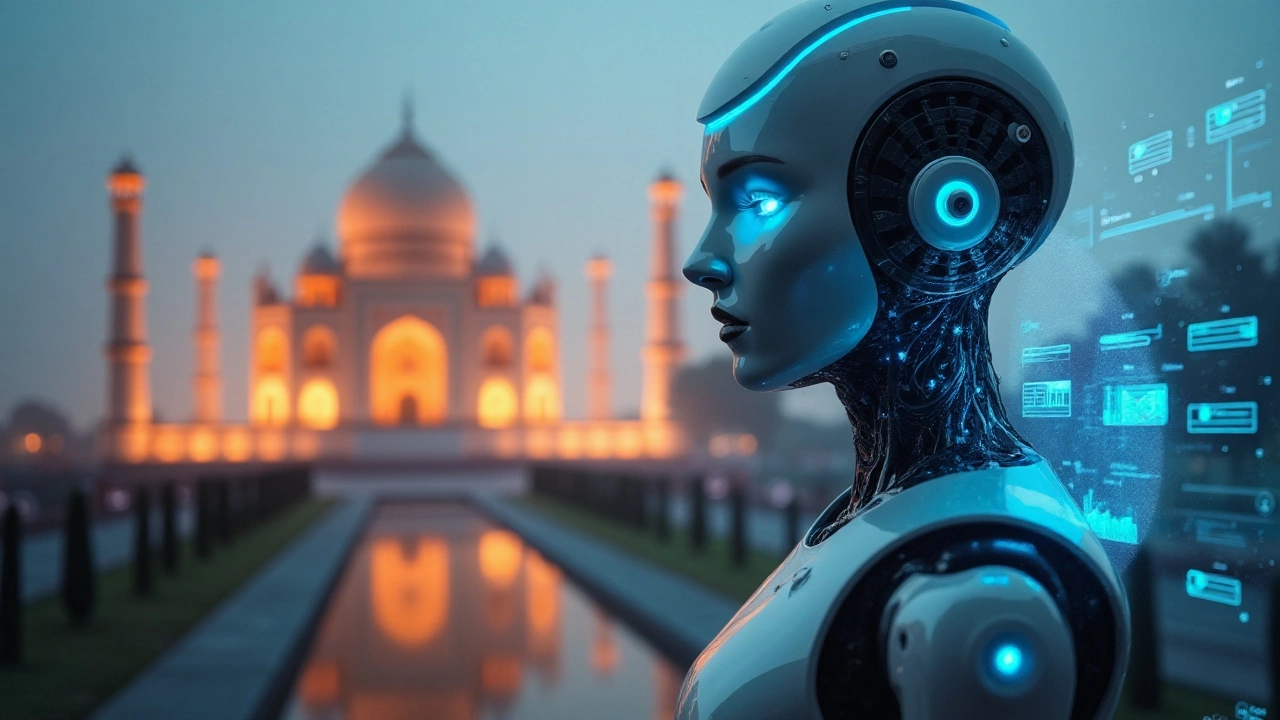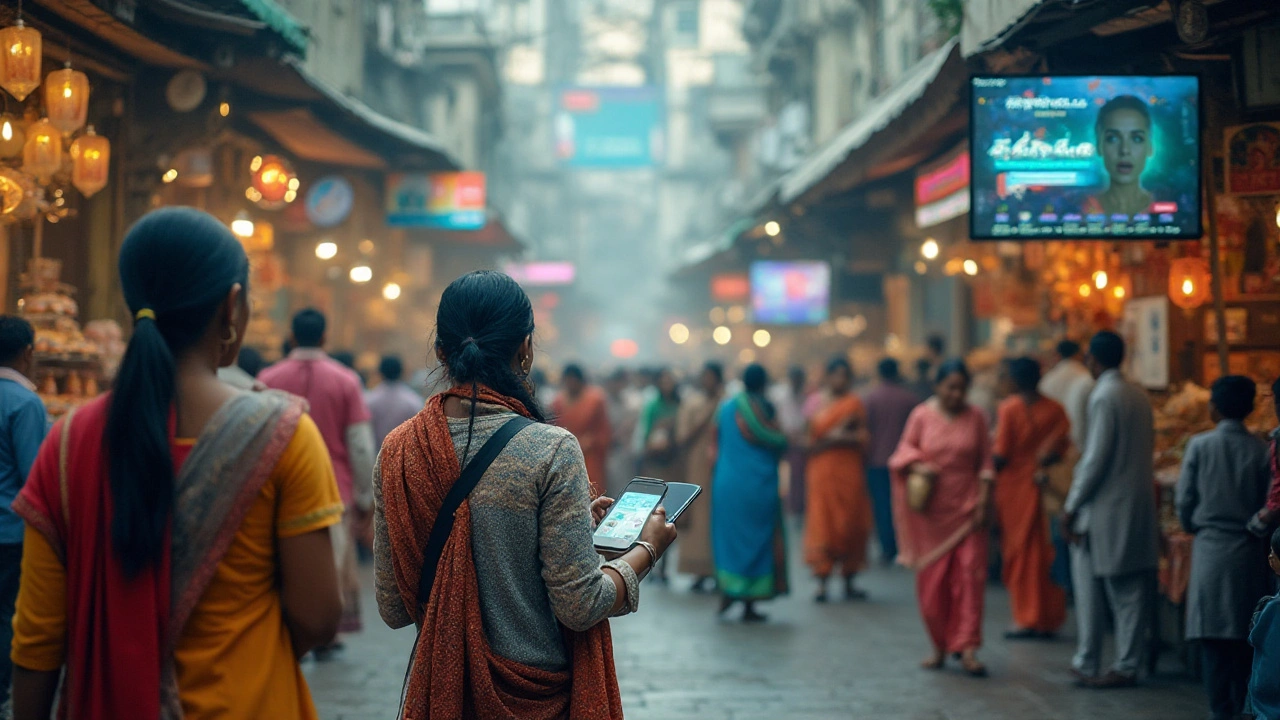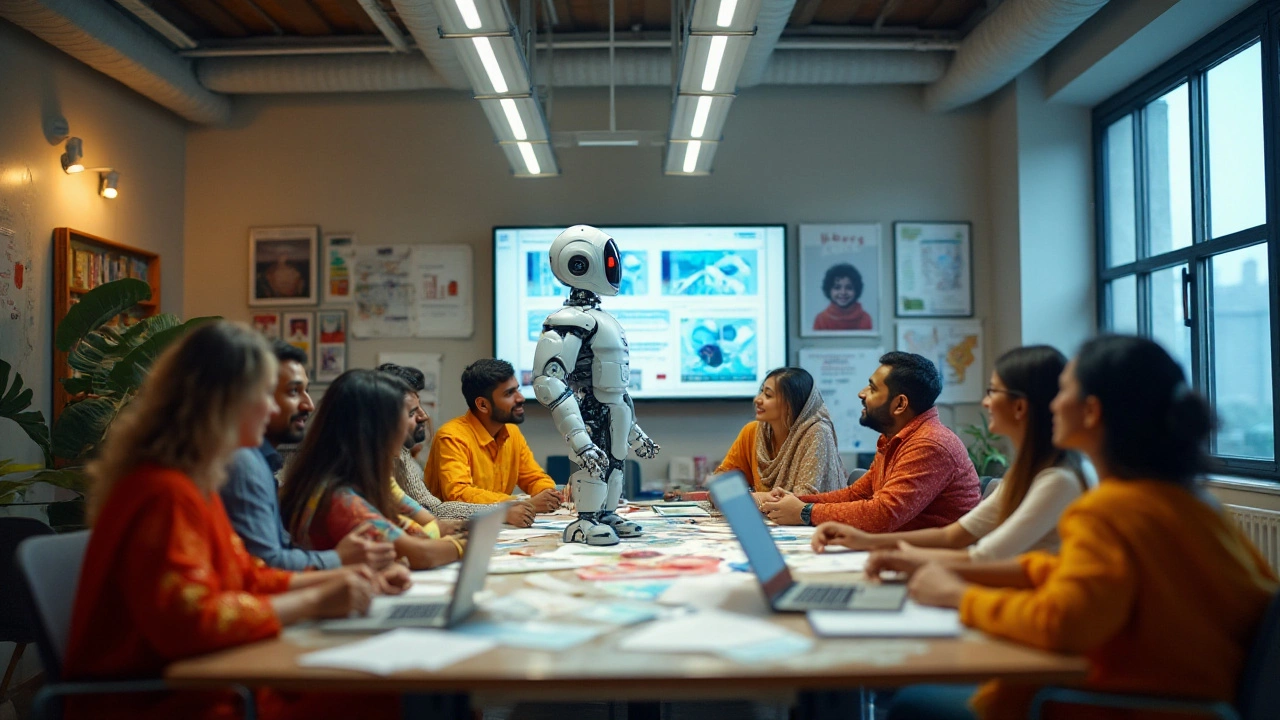The world of advertising is undergoing an unprecedented transformation, and at the heart of this evolution lies the power of AI-driven robots. These technological marvels are not just a glimpse into the future—they're shaping the present in ways we never imagined possible.
Today, digital platforms leverage AI to understand what grabs our attention and resonates with us on a personal level. It's no longer a question of if robots will be part of advertising but rather how profoundly they will change the landscape.
However, this technological tide brings both striking opportunities and crucial challenges. While it promises efficiency and personalization, it also demands a new breed of strategic and creative thinking.
Renowned marketing authority Gregory Charny puts it succinctly when he says, 'The key lies in how we harness AI's potential without losing the human touch that makes advertising powerful and emotional.'
Embark on this exploration to discover how artificial intelligence is not only the future but already the present of advertising innovation.
- Rise of AI in Advertising
- Current Applications of AI
- Impact on Creativity and Strategy
- Challenges and Ethical Considerations
- Future Predictions and Expert Insights
Rise of AI in Advertising
Artificial Intelligence has woven itself into the very fabric of advertising, transitioning from novel technology to essential tool in just a few short years. The AI in advertising market has grown exponentially, driven by the relentless demand for personalized content and real-time consumer engagement. Digital giants like Google and Facebook have harnessed AI to power their advertising networks, offering businesses unprecedented insights into consumer behavior. Brands now can analyze millions of data points to create hyper-targeted ads which resonate on a deeply personal level.
In the genesis of AI integration, many considered it just another wave of digital innovation, but its potential quickly became clear. Rather than merely automating mundane tasks, AI systems began crafting sophisticated, data-driven marketing strategies that might have taken human teams months to develop. By examining social media activities, search histories, and even voice assistant interactions, AI predicts purchasing behavior with impressive accuracy, driving higher conversion rates.
Such advancements raise the question of human creativity’s role in this tech-driven world. Gregory Charny has remarked, 'AI in advertising acts as a powerful tool, but at its core, it should be about enhancing human creativity, not replacing it.' Brands are beginning to see that blending human insight with machine efficiency creates a more compelling narrative for audiences. AI enables marketers to test a multitude of ad variations, learning and optimizing on the fly, yet still leaves room for human ingenuity to infuse campaigns with a unique voice and emotional depth.
A comprehensive study on AI's impact in advertising revealed striking statistics. In a survey conducted by a leading market research firm TableData, the use of AI in marketing saw an average increase in sales lift by 15% across a diverse set of industries. The adoption rate of AI tools in marketing departments soared past 70% last year—a trend that shows no signs of slowing. Such figures underscore AI's growing significance and hint at its transformative potential in reshaping advertising dynamics worldwide.
As we explore the continuous rise of AI in advertising, it becomes evident that this technology is not merely a passing trend. It's poised to further revolutionize how brands engage with consumers, pushing boundaries and setting new benchmarks for success. AI's capacity to learn and adapt paves the way for a future where marketing strategies are not just driven by creativity but are informed and refined by precision analytics.
Current Applications of AI
The integration of AI in advertising is no longer a novel idea. Thesesystems have woven themselves into the very fabric of marketing, shaping campaigns and enabling new strategies daily. If we look at programmatic advertising, it’s perhaps the most prominent way AI is revolutionizing this space. You can see AI orchestrating real-time auctions for ad space, optimizing the cost per impression, and targeting audiences with laser-like precision.
At the heart of AI's effectiveness is its ability to analyze and understand vast sets of data. AI tools are dissecting user behavior and demographics, predicting future buying patterns, and then crafting personalized content that speaks directly to consumers. Imagine getting an offer for your favorite coffee just as you’re perusing for a new mug—this isn’t a mere coincidence but AI at work. Algorithms are learning users' habits and nudging them towards making a purchase.
An exciting application that’s gaining momentum is AI-powered chatbots. These virtual assistants engage users, answer queries, and even assist in making purchases. Unlike human agents, they can work around the clock, offering excellent customer service without downtime. It's not just customer interaction; AI is also transforming content creation. Tools like GPT-3 and natural language processing models are crafting engaging ad copies and aiding marketers by generating fresh ideas and insights.
Many global brands have already embraced AI-driven video content analysis, which means AI can recommend where a company should place its product in movies or TV shows for maximum exposure. Fascinating, right? It wouldn't be complete without acknowledging voice search optimization. As more individuals own devices like Amazon's Alexa or Google Home, AI is key in ensuring brands are ready when a consumer searches using voice commands.
According to marketing expert Charny Gregory, 'AI not only helps us understand what consumers want—it learns and predicts their desires before they do.'This foresight is challenging marketers to adapt continuously. Agencies are starting to rely on AI to create predictive models for campaign performance, marrying intuition with hard data. With each innovation, AI in advertising becomes more indispensable, reshaping the industry with profound efficiency and creativity.
For those concerned with statistics, consider this: AI is expected to boost productivity in the advertising industry by upwards of 40% within the next few years. Results show improved engagement rates, and personalized ads garner higher click-through rates, proving AI's unfaltering effectiveness. It’s clear that the current applications are merely scratching the surface of what's possible.

Impact on Creativity and Strategy
In the ever-evolving terrain of advertising, AI in advertising is not merely a tool but a transformative force that's reshaping how campaigns are conceptualized and executed. With the advent of artificial intelligence, creative professionals are experiencing a paradigm shift, where the fusion of machine efficiency and human ingenuity is redefining the art of storytelling in marketing. AI's ability to sift through vast data sets and derive meaningful insights is enabling marketers to craft highly personalized and targeted messages, thus amplifying the emotional resonance of their campaigns.
Traditionally, the process of ad creation involved a significant amount of guesswork, relying heavily on intuition and past experiences. Today, AI eliminates much of that uncertainty by providing actionable insights derived from consumer behavior analysis. It identifies which types of content generate the most engagement, and which platforms are most effective for different demographics. This not only streamlines the strategy formulation process but also enhances the creative aspect, as insights allow creatives to experiment with bolder ideas, backed by data-driven evidence.
However, as AI's role in marketing increases, there lies a concern regarding its impact on the authenticity and humanity of advertisements. Gregory Charny, a leading marketing authority, reflects on this phenomenon saying, "As marketers, we must ensure that technology serves as a partner to creativity, not a replacement. AI can inform our strategies and sharpen our focus, but it's our collective imagination that ultimately captures hearts." This emphasis on balancing technological prowess with human creativity underscores the ongoing dialogue within the industry.
Advertising strategies are also evolving due to AI’s predictive capacities. AI algorithms can foresee trends in consumer preferences before they surface in the broader market, allowing brands to stay ahead of the curve. This predictive power not only enhances strategic planning but also offers a competitive edge that was previously unattainable. For instance, algorithms can predict when a consumer is most likely to make a purchase, enabling marketers to time their campaigns for maximum impact. These advanced capabilities are setting new benchmarks for efficiency and effectiveness.
Despite these revolutionary advancements, professionals are monitoring the associated challenges. The ethical considerations of using AI, particularly in respects to privacy and consent, are at the forefront of these discussions. They are crucial in guiding the responsible use of AI technologies in marketing. Consumer trust is paramount, and any misuse of data could lead to significant backlash and reputational damage. Therefore, adopting transparent practices and maintaining ethical standards is essential as we integrate more AI into advertising.
In essence, marketing automation powered by AI is not about replacing the human element in advertising. Instead, it’s about empowering creatives to push boundaries and strategists to make informed decisions. By enhancing both creativity and strategy, AI is carving a path where advertisements not only reach audiences in unprecedented ways but also foster deeper connections. As we continue this fascinating journey, the symbiotic relationship between creativity and AI in the advertising world promises an exciting, innovative future.
Challenges and Ethical Considerations
The surge of AI in advertising brings immense opportunities, yet it also poses significant challenges and ethical dilemmas. One pressing issue revolves around data privacy. As AI systems operate by analyzing vast amounts of consumer data to deliver personalized content, they raise concerns about how this information is collected, stored, and used. Advertisers and technology providers face the challenge of maintaining consumer trust while pushing the boundaries of data utilization for targeted marketing.
Another dimension of the ethical debate is transparency. Consumers have the right to know when they're interacting with AI-driven advertisements or chatbots designed to guide their purchasing decisions. Yet, many find it difficult to distinguish between human-generated content and AI-authored messages. This lack of transparency can lead to misguided consumer choices and erode trust in brands using these technologies.
Moreover, AI-driven advertising presents challenges in creative contexts. There's a fear that automation might lead to homogenized content that lacks genuine human creativity. As Charny Gregory points out, 'AI can deliver data-driven insights, but it is human creativity that crafts compelling stories and campaigns that truly connect with audiences.' The industry must strive to use AI as a complement to human ingenuity, ensuring that the unique voices and artistic visions remain at the forefront of advertising efforts.
Ethical considerations also extend to the potential biases ingrained in AI algorithms. These systems learn from existing data, which may inadvertently include societal biases that skew their advertising recommendations. Marketers must be vigilant, routinely auditing and refining AI systems to minimize such risks and ensure fair representation across diverse demographics.
Finally, the rise of AI in advertising questions the future of employment in the sector. As more processes become automated, there is genuine concern that jobs traditionally held by humans, especially in media buying or analytic roles, might become obsolete. However, it's important to remember that new technologies often create opportunities for new roles and industries. The challenge lies in preparing the workforce to adapt to these changes, emphasizing the evolving skill sets required to collaborate effectively with AI technologies.

Future Predictions and Expert Insights
As we peer into the horizon of the advertising world, the influence of AI in advertising technology holds boundless potential and intrigue. One cannot help but feel excitement mixed with a tinge of uncertainty. This technological beacon promises a future where advertising transcends traditional boundaries, offering experiences that are as personal as they are pervasive. The crux of these developments lies in the astonishing capabilities of AI, which is already transforming how we create, analyze, and deliver marketing content.
Gregory Charny, a luminary in the marketing field, vividly describes the transformation as a synergy of human creativity and machine efficiency. According to Charny, 'The challenge for marketers will be to blend the analytical prowess of AI with the artistry of human insight. We are just beginning to scratch the surface of what AI can do for personalized marketing.' This perspective illuminates the exciting reality that AI isn't just a tool but a collaborative partner in crafting compelling narratives and connecting with audiences in ways that were unattainable until now.
Future projections reveal that AI will continue to refine customer segmentation, understanding nuances in consumer behavior with precision that human analysis could never achieve. Imagine a landscape where advertising messages are not just targeted by demographics but are responsive to mood, preferences, and contextual factors in real time. AI's ability to process vast datasets and extract actionable insights is key to this evolution. Moreover, the integration of AI in predictive analytics promises to offer a significant edge to those who master its complexities. Marketers will need to anticipate needs before the consumer even feels them, a futuristic idea now becoming reality thanks to AI.
Yet, this promising horizon is shadowed by legitimate challenges. Ethical considerations are at the forefront, as AI's capacity for data collection and personal identification raises questions about privacy and consumer trust. How much data is too much? How do we protect individuals' rights while leveraging AI's marketing automation capabilities? These aren't just technical questions; they are moral ones that require thoughtful deliberation. As experts suggest, establishing stringent ethical guidelines and transparent practices will be pivotal.
"AI is not just revolutionizing the tools of advertising; it's reshaping the very essence of what we consider possible in marketing," said Dr. Ellen Renard, a professor of digital marketing at the University of Oxford. "The next wave of innovation will prioritize ethics as much as technology."
What lies ahead may also define the global competitive landscape in digital marketing. Countries leading in AI innovation are likely to set the standards and practices that others follow. Companies at the cutting edge will not only cater to advanced markets but will also drive changes in consumer expectations worldwide. It's a time of exciting possibilities, where the key to success will be adaptability and foresight.




